One of the best ways to discover keyword opportunities for pay-per-click advertising campaigns, content marketing topics, and search engine optimization is to identify which keyword phrases your company’s competitors are ranking for on popular search engines.
Thanks in part to keyword analysis tools such as Ahrefs, SEMrush, SpyFu, and Moz’s Keyword Explorer, it is easy to identify competitors, see which keyword phrases they are successful with, and find opportunities to grow your own business.
In this article, I’ll address a few ways to identify the keywords that may be working well for your competitors. In all cases, I’ll assume we are researching for a hypothetical farm and ranch supply retailer, and we will use Tractor Supply, which is perhaps the largest farm and ranch chain in the United States, as our competitor.
Organic Keywords
Let’s start by looking for some of the keyword phrases Tractor Supply ranks for organically. For this example, we’ll use Ahrefs.
The Ahrefs’ Site Explorer estimated that Tractor Supply is ranking for about 1.3 million organic keywords.
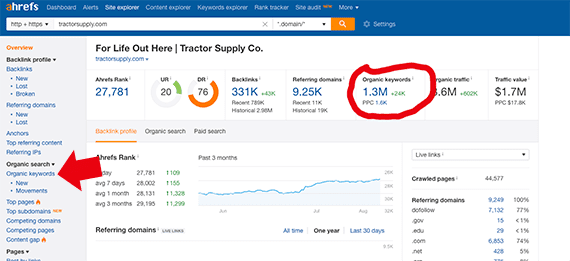
One quick search on Ahrefs and we learn that Tractor Supply ranks for about 1.3 million keywords.
We can dig a little deeper with the tool’s organic keyword report. This report can be filtered by position on a typical search engine results page, the estimated monthly search volume, the keyword difficulty, and several other factors.
Let’s only consider keyword phrases for which Tractor Supply ranks in the top five positions on a typical SERP. We’ll filter further, returning only phrases that get about 5,000 searches or more per month, and, lastly, we want to target keywords with a relatively low keyword difficulty score of 20 or below, meaning they may be relatively easy to target.
We discover 259 keyword phrases that meet our criteria. Here are a few examples.
| Keyword Phrase | Volume | Difficulty | Position |
|---|---|---|---|
| "Coveralls for men" | 6,400 | 7 | 3 |
| "Air compressor" | 112,000 | 18 | 4 |
| "Muck boots" | 77,000 | 6 | 5 |
If we carry these products, we may be able to rank for them pretty quickly, possibly displacing our competitor in one of these positions.
We could make “Muck boots” a focus of our SEO efforts, develop content around Muck Boots (which is a brand name), or we could consider the term for a PPC campaign.
PPC Keywords
Having identified good organic keywords, we may be interested to learn which phrases our competitor buys. We’ll use SpyFu to identify those phrases.
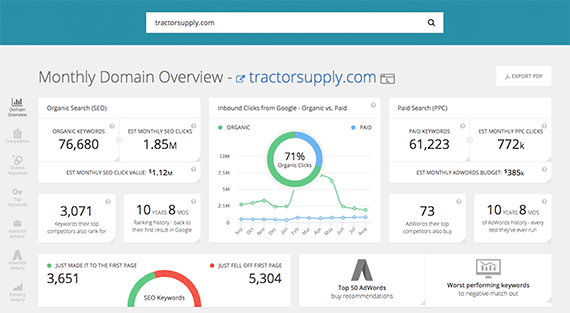
SpyFu focuses specifically on competitors and helps us discover which keywords Tractor Supply buys for its pay-per-click campaigns.
The tool informs us that Tractor Supply had 61,223 paid keywords. It is generating about 772,000 PPC clicks each month on an investment of around $385,000.
If we start to look at the individual keywords Tractor Supply purchases, we can see that it is buying “waterproof work boots.” The phrase is driving around 12,000 visitors to the Tractor Supply site at the cost of around $3,180 per month.
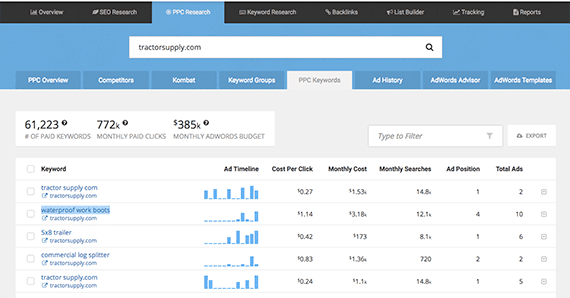
We can identify the individual keyword phrases and learn a lot about how they might perform.
This information is interesting because “Muck boots,” one of the keyword phrases we identified in the previous section, is a brand of waterproof work boots.
If Ahrefs and SpyFu are correct, Tractor Supply may be driving a lot of traffic to this category of products. In turn, this may be an indication of buying intent. We don’t know for certain, but it may be that shoppers who search for “Muck boots” or “waterproof work boots” do so because their feet are getting wet and they want a solution. Targeting these keywords or similar ones might lead not just to site traffic, but also to sales.
Keywords from Top Pages
A third technique for mining keywords from competitors is to look at a competitor’s best-performing pages and learn which keyword phrases are driving the traffic.
This data can be uncovered with SEMrush’s Organic Research Pages report or Ahrefs’ Hot Pages report, among others. The Ahrefs tool, as an example, listed thousands of individual pages from the Tractor Supply website, including the Muck Boots brand landing page, which was ranking for 863 keyword phrases and earning around 9,400 monthly visitors.
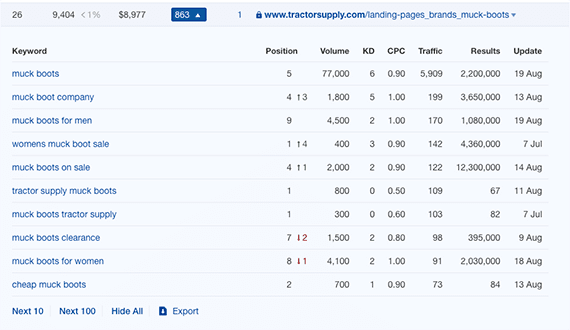
We can examine a competitor’s top performing pages, reviewing the individual keyword phrases those pages support.
We can look through the list of associated keyword phrase and find opportunities. “Muck boots for women” could be a good niche page or the topic of a blog post that featured the styles our store carries for women.
We can use this approach repeatedly to generate a long list of good keyword phrases that may represent buying intent.
Repeat the Process
With just a bit of research, we have several potential keyword opportunities taken from a competitor’s keyword profile. But we don’t have to stop with just one competitor.
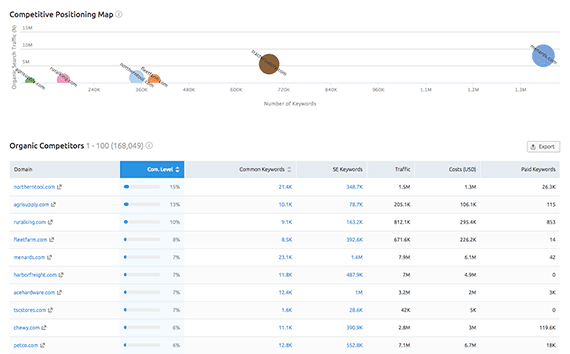
Even if we are just familiar with a few competitors, we can generate a list of potential subjects using the very same tools that help us identify their keywords.
We can use SEMrush to generate a list of potential competitors. Tractor Supply, our imagined competitor throughout this article, is just the beginning as we can identify many similar companies using SEMrush’s competitors’ report. For each competitor, there will likely be unique keyword opportunities.




